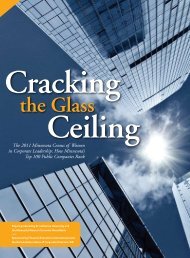temporary restraining order - Finance & Commerce
temporary restraining order - Finance & Commerce
temporary restraining order - Finance & Commerce
Create successful ePaper yourself
Turn your PDF publications into a flip-book with our unique Google optimized e-Paper software.
“proper challenges to the bid-letting process should be encouraged” (emphasis added). See also<br />
Concept Automation, Inc. v. United States, 41 Fed.Cl. 361, 370 (1998) (“the public interest in the<br />
integrity of the competitive bidding process can only be vindicated by encouraging, or at least<br />
not discouraging, protests of wrongful actions”) (emphasis added).<br />
For more than 50 years, the Minnesota Supreme Court has recognized that the public has<br />
a strong interest in maintaining the integrity of public procurements. Griswold, 65 N.W.2d at<br />
652. The U.S. Court of Federal Claims stated the benefits of challenges to procurement<br />
decisions in Concept Automation, Inc. v. United States, 41 Fed.Cl. 361, 366 (1998):<br />
The purpose of the bid protest scheme is twofold. First, it is designed to<br />
benefit the taxpayers, and hence the government, by making government<br />
procurement both more fair and more efficient. This is so in various ways. If<br />
contractors have an honest and fair system, they will be more willing to deal with<br />
the government at a lower price. Also, if the government acts honestly and<br />
rationally, the government and the taxpayers will get the best deal for their money<br />
and needs. Finally a fair and efficient system will maximize public accountability<br />
and allow for more rational planning for future needs. The other basic purpose is<br />
to benefit those who do business with the government. This is partially based on<br />
basic fairness or justice. People, whether citizens, foreigners, or even contractors,<br />
should be treated fairly. It is also based on sound business practice. It is critical<br />
to deal with vendors, suppliers, or customers properly. Otherwise, you may<br />
encourage them to treat you badly.<br />
Minnesota and federal case law are uniform that all bidders must be treated fairly and<br />
equally in the process to award a public contract. Without assurance that bidders will be treated<br />
equally, vendors will be discouraged from bidding on future projects. As described above, fewer<br />
vendors means less competition and higher prices in the future. The public is entitled to<br />
procurement processes and decisions that are transparent and comply with public bidding laws.<br />
The public interest and the relationship of the parties heavily favors the issuance of an<br />
injunction to ensure that St. Paul acts fairly and the public’s purse is safeguarded. Plaintiffs are<br />
protecting both their own and the public’s interest by moving to enforce the State’s procurement<br />
laws and the integrity of this procurement.<br />
N:\PL\85155\85155-001\1607234.docx 17



